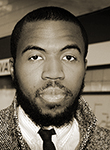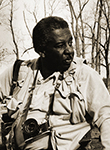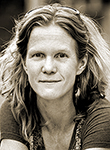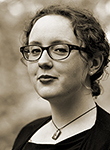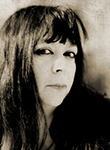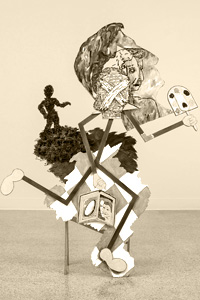The past few months have seen too many contributors and friends lost to death, and we therefore call your attention to our In Memoriam list, where we recognize the legacies of poets Claudia Emerson, Philip Levine, Tomaž Šalamun, Mark Strand, and Tomas Tranströmer, as well as Richmond art champion Beverly Reynolds. We are grateful to them all for work well done.
Fortunately, new artists of note emerge regularly to contribute their own poems and stories to the vast sea of our experience, and each spring Blackbird’s Introductions Reading Loop recognizes several of these writers whose work strikes us as unusually fine and full of promise. Joining this company are poets Joshua Bennett, Anders Carlson-Wee, Celeste Lipkes, Kat Meads, and Emily Vizzo and fiction writers Michelle E. Iwen, Hiba Krisht, and Jon Chaiim McConnell. These writers demonstrate yet again that our best art is, thankfully, a renewable resource.
In Gallery, the photographs of Richmond native Louis Draper remind us that experience conveys vividly in image, and Blackbird joins the VMFA in celebrating the achievement of this under-recognized artist and founding member of the Kamoinge Workshop, a collective of African American photographers with roots in the early 1960s. Thirteen photographs acquired by the VMFA, commentary by VMFA curator Sarah Eckhardt, and an interview conducted with Nell Draper-Winston, the artist’s sister, by Eckhardt and Candela Gallery’s Gordon Stettinius are featured here.
Nearly thirty years ago, in his groundbreaking, impassioned, and now classic work on the environmental crisis, The End of Nature, Bill McKibben offered his readers a compelling insight into the fundamental contradiction between the way human beings believe that nature “takes forever” and the inarguable truism that “events, enormous events, can happen quickly.”
These events impinge like the “Boom” that Jenny Browne decodes as it sweeps through “grassless / pastures” where language itself, its alterity as jargon, swiftly reduces “a hand” to a signifier for “the one who pigs / the pipelines clean.” Browne reminds us that such bewilderment is one of the oldest stories and confesses: “each time I say // I can’t imagine / I also say // I don’t want to.” Strangers perhaps to the wilderness within and without their vehicle, the passengers in Tomás Q. Morín’s “Echo” never quite manage to “stop watching the road” long enough for the distant landscape, “the great green cat / on the horizon,” to transport them—beyond grief, beyond their own refusals to be surprised.
After all, it is little more than the daily miracles of motion and repose that Tomaž Šalamun’s mad refrains dare us not to celebrate, certain as he is that the very wilderness of the seasons is what “grooms the fat / of boats. Every spring, every spring, / every spring.”
Such exaltation finds a quiet companion in Brian Henry’s deft translations of Slovenian poet Aleš Debeljak, whose daydreamers of the absurd remind us that, although “Incurable diseases and supermarkets have spread,” we might still “sunbathe together / in spacious courtyards, where lizards lie, bright green / like childhood times.”
Many of the writers gathered here interrogate tropes of what now passes for nature, rummaging through its damaged archetypes, offering up mediated, disheveled landscapes—roadside, seaside, mountainside—to sound the depths of a new pastoral mode, one that might bridge, without irony, the traditional distance between witness and nature’s array of transient, utterly vulnerable subjects.
Emilia Phillips catalogs and maps, reporting from recent travels how “seagulls land and become a landscape over a landscape, as snow does: a contour line, a living topography.” Suspicious of the flipped script our “similes / of nature” seem to follow now, of how trees get figured as “telephone poles,” and a “wingspan, a hanging up receiver,” Phillips subtly enjoins us to reevaluate the logic of the one-way street.
That street joins the “dirt road” Diane Seuss claims to have “hustled down” with some itinerant poet, a track as nameless as her wanton, muse-wracked companion that, despite its rustic finish, manages to part “the meadow like a comb.” All flesh is grass Seuss reminds us dramatically; “the body is but a playhouse for the soul.” Or, as C.L. O’Dell narrates it: “I find grass, and it’s as if an honest man / is telling me a story. Here, snow / means two things: blood / and hunger.”
In Fiction, Kathy Flann’s “Show of Force” introduces us to a couple reeling from fear and perceived inadequacies, all while their teenage son distances himself from them, well on his way to becoming a prodigy gamer. Flann sharpens the spaces and silences between the three characters, allowing them to slowly embrace their stumbles, redefining their flaws as something worth saving.
Language becomes a powerful connecting force in Vedran Husić’s “Translated from the Bosnian,” a haunted, searing portrait of a man desperately trying to communicate with his family after they are wrenched apart during the Bosnian War. Through a series of letters, Alen admits, “I feel that I have failed to make myself understood,” a fear that sharpens the urgency of each written word. The story dramatizes that failure—“a ruin in translation”—while marveling at the way language can reverberate across time, revealing what “the camera cannot capture.”
The First Novelist Reading Loop presents Helene Wecker, winner of the 2014 Cabell First Novelist Award for The Golem and the Jinni, which imagines a turn-of-the-century New York City populated by supernatural beings struggling to form connections in the all-too-human communities around them. The reading loop features a reading from the novel, a panel with Shannon O’Neill and Sam Stoloff detailing the book’s journey to publication, a conversation with Wecker, and a review of her debut book.
In Nonfiction, David Wojahn offers up a lover’s provocative argument in “Can Poetry Save Your Life? A Brief Investigation,” an essay that assembles opinionated commentary and empirical data as it explores the lives and works of Ben Jonson, Etheridge Knight, Miklós Radnóti, Czesław Miłosz, Thomas Hardy, Lynda Hull, and C.P. Cavafy (with brief cameos by James Franco, Jeff Buckley, Leonard Cohen, and Joseph Stalin).
Lynda Fleet Perry’s thoughtful and comprehensive consideration of the work of poet Margaret Gibson reminds us how Gibson’s essential meditations combine “lyric precision with an earthy sensuality” and introduces a new generation of readers to a poet historian whose attentive gaze renders the world in such a way that we take courage in her assertion that there is to be “nothing forgotten or feared. Day or night, / whatever the hour, it will be all shining.” A reading by Gibson, paired with essayist Hal Crowther, appears in Features.
Matt Donovan recounts the God-like, omnipresent beauty he experienced during his eleven-month sojourn in Rome in “Almost a Full Year of Stone, Light, and Sky.” Of the endless possibilities for exploration and insight Rome offers, Donovan focuses on the Pantheon, a single structure as compelling as the rest of the city combined. He guides his reader through what “this one ancient place” can “offer, suggest, redeem.”
Also in Nonfiction, the complex and various possibilities of “I”, “thing,” and “forever,” as Lawrence Sutin attempts to understand them, are fodder for philosophic musing in “Can I Find a Thing to Carry Forever?” In this essay, as Sutin speaks with his young daughter, he imagines a key to an old apartment, and he asks, Does anything last?
Other offerings include Carol Ann Davis investigating Elizabeth Bishop and reviews of new work by Maxine Kumin by Caitlin Doyle, Darcy Steinke by Chelsea Gillenwater, M.O. Walsh by Matthew Phipps, and Linda Bierds by Susan Settlemyre Williams.
In Gallery, images and catalogue commentary that appeared as part of a retrospective of the work of Myron Helfgott in VCU’s Anderson Gallery remind us that a life spent in art provides moments of provocative joy for a viewer as well as for the artist, and Lynne Elson’s excerpted play A Blessed Unrest offers art as a true locus for finding what keeps us tied to living.
Mary Selph once again mines the Internet archives and this time presents material that records period responses from the African American community to The Birth of a Nation, which this year marks its centenary. Included is the full-length silent film Within Our Gates, directed by Oscar Micheaux.
Readings in Features by poets T.R. Hummer and Patricia Smith round out the issue. ![]()
Return to top menus | Browse issue



